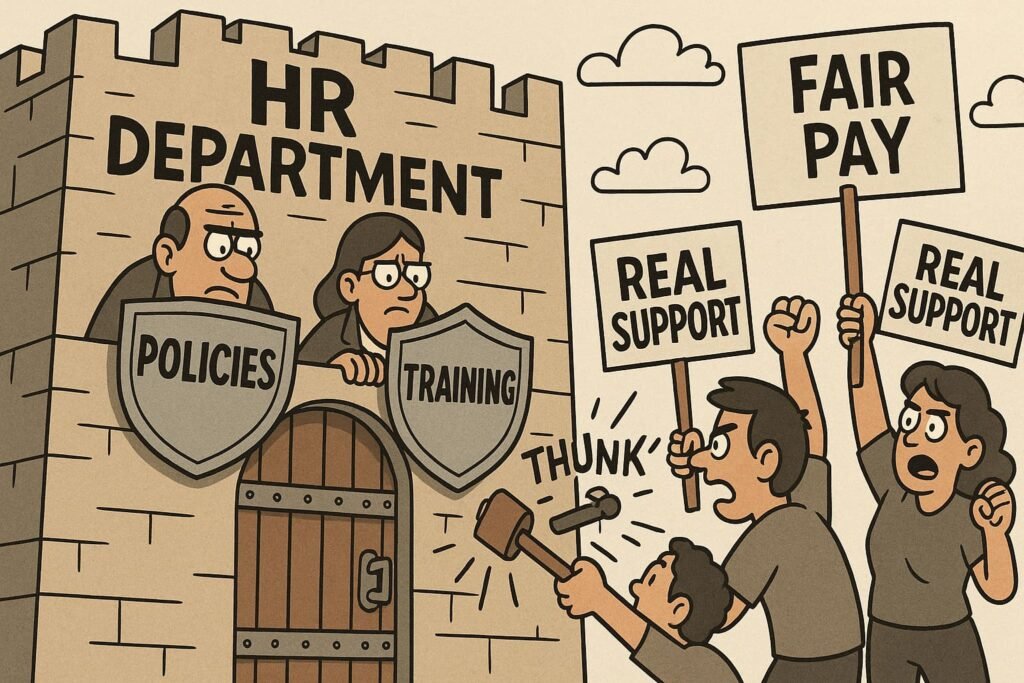HR Bureaucracy Explained – How Managers Stay Safe
From People Department to Culture Police
HR used to mean payslips, contracts, and job interviews. Simple. Today? It’s the frontline of woke politics — and the shield of corporate management.
On the surface, HR sells fairness, inclusion, and safety. In practice, it builds bureaucracies that police language, enforce ideology, and protect executives from risk. Workers don’t get empowerment. Managers get cover.
Table of contents
From People to Paperwork
HR once bridged workers and bosses: handle disputes, hire staff, pay wages. But as corporations grew and woke politics spread, HR mutated. The new mission: manage culture, not just contracts — and protect management from accountability.
How HR Became the Culture Police
- Speech Codes – employees told which words are acceptable, often under threat of discipline.
- Mandatory Training – from unconscious bias to microaggressions, sessions that rarely change behaviour but keep consultants rich.
- Complaint Systems – colleagues encouraged to monitor each other. Dissent gets reframed as “hostility” or “unsafe behaviour.”
It looks like progress. It feels like surveillance.
Bureaucracy as a Shield for Management
Here’s the kicker: all those policies and training sessions don’t really protect workers. They protect managers.
- Paper Trails – proof that “we followed procedure” when lawsuits appear.
- Training Records – liability cover: “we ran the course, so don’t blame us.”
- DEI Firewalls – questioning leadership can be reframed as “anti-inclusion.” Morality doubles as management’s armour.
HR isn’t fixing inequality. It’s covering liability.
The Hidden Costs for Workers and Businesses
This culture-and-compliance machine comes with a price tag:
- Silence and Fear – staff avoid speaking freely, worried HR will label them the problem.
- Time Lost – hours drained by training slides and endless forms.
- Ignored Real Issues – wages, job security, career paths vanish under bureaucracy.
- Small Business Squeeze – big firms can absorb the rules; smaller ones drown in them.
Workers lose voice. Smaller businesses lose ground.
Who Really Benefits?
- Managers – shielded from lawsuits and criticism.
- Executives – liability outsourced to HR.
- Consultants – profit from an endless training industry.
- Politicians – boast of “progress” while dodging real reforms.
Not workers. Not the people HR was supposed to serve.
Why It Matters
HR bureaucracy reveals the double game: woke politics as culture policing, managerial capitalism as self-protection.
The workplace is filled with policies and posters about fairness, but the reality is:
- Managers safe.
- Workers silenced.
- Bureaucracy forever.
When HR stops being about people, it becomes the perfect shield for power.
👉 For the bigger picture of how corporations gained their power, visit The Power of Business & Corporations Explainer Hub.
FAQ
What changed in HR under woke politics?
It shifted from contracts and pay to speech codes, training, and culture policing.
Why so much mandatory training?
It creates legal cover for managers — proof they “did something” if problems arise.
Who benefits from HR bureaucracy?
Managers, executives, and consultants. Not the workers.
Why is it dangerous?
Because it stifles debate, silences employees, and buries real workplace issues under red tape.
What’s the impact on small businesses?
Big corporations can absorb compliance; smaller firms can’t. They pay the price.



